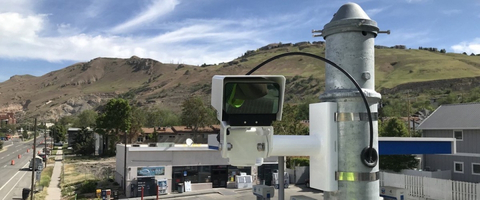Cepton’s Helius® Smart Lidar System utilized by NITC-affiliated researchers from UTA in Texas-based studies since 2020
Collaboration enabled an innovative traffic signal solution in line with national Vision Zero and Complete Streets initiatives
Project currently under evaluation by UDOT for potential expansion in Utah, expected to mature
Cepton, Inc. (“Cepton”) (Nasdaq: CPTN), a leader in high performance lidar solutions for the automotive and smart infrastructure markets, announced today that its lidar technology has been used in groundbreaking studies in Texas and Utah to help improve traffic safety for all road users, in alignment with the national Vision Zero and Complete Streets initiatives.
This press release features multimedia. View the full release here: https://www.businesswire.com/news/home/20230426005465/en/

Cepton’s lidar solutions have been deployed in groundbreaking NITC-funded studies in Texas and Utah to help improve traffic safety for all road users. Image courtesy of Utah DOT. (Photo: Business Wire)
Cepton’s Helius® Smart Lidar System, which combines lidar sensors with edge computing and intelligent perception software, has been deployed by researchers from the University of Texas Arlington (UTA) through the USDOT-funded National Institute for Transportation and Communities (NITC) at two busy intersections in two Texas cities: one in Arlington, Texas, which connects two UTA campuses; the other in the neighborhood of a high school in Irving, Texas.
The deployments enabled two studies funded by NITC, with additional support from the cities of Arlington and Irving, Texas, the Oregon Department of Transportation, UTA and the University of Utah.
The first study uses Helius to analyze pedestrian behaviors and revealed that pedestrian behaviors often do not align with recommendations in pedestrian facility design guides, such as the AASHTO "Green Book."
The second study focuses on the separation of left-turning vehicles from concurrent pedestrians crossings, utilizing an innovative dynamic flashing yellow arrow (D-FYA) system that generates signal operations based on real-time pedestrian analytics enabled by 3D lidar perception.
With proven effectiveness, the lidar-enabled D-FYA solution will be deployed in Salt Lake City, Utah in a project funded by the Utah Department of Transportation (UDOT). UDOT is already working on the implementation of this solution to further evaluate lidar’s potential capabilities of increasing the safety and efficiency of traffic operations.
According to UDOT, the system will enable operators to monitor pedestrians’ walking speeds and “look at things like red light running and near misses for pedestrians and vehicles,” enabling detailed traffic data collection that traditional detectors are unable to provide. The system could enable UDOT to “tailor traffic signals to travelers' needs, potentially adjusting signal timing in real time,” and has the potential to “integrate with vehicle-to-infrastructure (V2X) connected vehicle technology” to warn vehicles of potential hazards.
“Previous research has shown that cars may not look for pedestrians sufficiently on a flashing yellow arrow (FYA), as they search for a gap in traffic to make a left turn, which can be dangerous," explains Dr. Taylor Li, lead researcher on the project and Assistant Professor of Civil and Environmental Engineering at UTA. “To remove this risk, a traffic signal system can be programmed to turn off the FYA when a pedestrian walk button is pressed. It is not always efficient, however, as pedestrians tend to press all walk buttons available when they want to cross on a diagonal or change their decisions, and cars still have to wait out the rest of the programmed red time, when a pedestrian isn't really crossing or crosses very quickly.
“Using lidar, we are able to implement a real-time, dynamic crossing signal solution. Lidar does a great job in tracking pedestrian behaviors during yellow, all-red and the first few seconds of green lights, helping us understand their true intents. Powered by Cepton’s lidar technology, our innovative D-FYA system will help significantly increase the efficiency and throughput of intersections while prioritizing safety. We can’t wait to demonstrate its effectiveness in our next deployment in Salt Lake City.”
Dr. Jun Pei, CEO of Cepton, adds, “Pedestrian safety is essential to people-oriented transportation. We are thrilled that Cepton’s technology has been utilized in such groundbreaking studies and deployments that could revolutionize the way intersections are designed and operated. Our advanced lidar perception solution is designed to provide accurate, real-time 3D analytics that ultimately helps improve the walkability of streets. I am excited to see Helius deployed in more U.S. cities to help transform America’s traffic infrastructure, making safe, smart mobility accessible to everyone.”
Helius is Cepton’s award-winning perception solution for smart infrastructure applications. It features high-accuracy, real-time 3D object detection, classification and tracking and has been deployed worldwide in over 100 smart cities/spaces projects. For more information, visit https://www.cepton.com/products/helius.
About Cepton
Cepton is a Silicon Valley innovator of lidar-based solutions for automotive (ADAS/AV), smart cities, smart spaces and smart industrial applications. With its patented lidar technology, Cepton aims to take lidar mainstream and achieve a balanced approach to performance, cost and reliability, while enabling scalable and intelligent 3D perception solutions across industries.
Cepton has been awarded a significant ADAS lidar series production award with Koito on the General Motors business. Cepton is engaged with all Top 10 global OEMs.
Founded in 2016 and led by industry veterans with decades of collective experience across a wide range of advanced lidar and imaging technologies, Cepton is focused on the mass market commercialization of high performance, high quality lidar solutions. Cepton is headquartered in San Jose, CA and has a center of excellence facility in Troy, MI to provide local support to automotive customers in the Metro Detroit area. Cepton also has a presence in Germany, Canada, Japan, India and China to serve a fast-growing global customer base. For more information, visit www.cepton.com and follow Cepton on Twitter and LinkedIn.
View source version on businesswire.com: https://www.businesswire.com/news/home/20230426005465/en/
Contacts
Faithy Li, media@cepton.com
